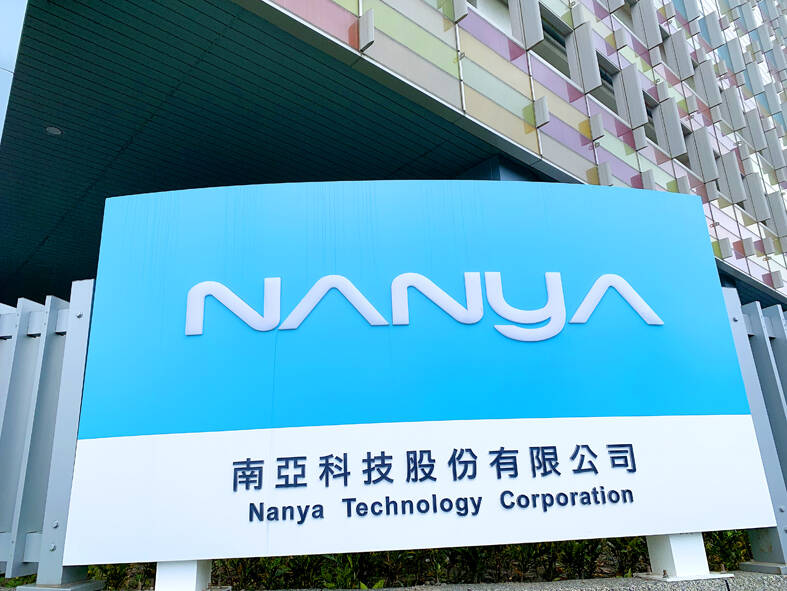Nanya Technology Corp (南亞科技), the world’s fourth-largest DRAM chipmaker, yesterday posted its smallest quarterly loss since the second quarter of last year as gross margin returned to positive territory for the first time in six quarters, driven by improvements in chip prices.
Losses narrowed to NT$813 million (US$24.95 million) during the quarter ended on June 30, compared with losses of NT$1.21 billion in the previous quarter. On an annual basis, losses widened from NT$771 billion.
Gross margin improved to 2.9 percent, compared with minus-2.9 percent in the first quarter and minus-11.2 percent in the second quarter last year.

Photo: Grace Hung, Taipei Times
Nanya Technology said it would have nearly broke even last quarter, if not for the effects of a massive earthquake in April that led to the company incurring about NT$657 million in damage.
Nanya president Lee Pei-ing (李培瑛) said the company might be able to post a profit this quarter, thanks to improving DDR4 inventory and better average selling prices, following a sequential increase of 12 to 13 percent last quarter.
Earlier this week, TrendForce Corp (集邦科技) predicted that DRAM prices would increase 8 to 13 percent this quarter from a quarter earlier.
The company’s shipments are expected to return to growth this quarter after dropping 5 percent sequentially last quarter, Lee said.
Shipments for the whole of this year are expected to grow 20 percent, given a lower comparison base last year, he said.
As the world’s three major memorychip makers race to produce high-bandwidth memory (HBM) chips and DDR5 modules used in artificial intelligence servers or high-end servers, the companies would produce fewer DDR4 chips, which would benefit Nanya Technology, he said.
However, economic slowdowns in China and Europe, along with geopolitical tensions, would continue to affect the use of DRAM chips used in PCs, smartphones and consumer electronics, Lee said.
China, alone, purchases about 40 percent of mobile DRAM, he said.
Nanya Technology has no plans to produce HBM chips in the short term, as the company’s strategy is to tap the DDR5 market first, he said.
DDR5 chips are also used in high-end cloud-computing devices and PCs, the company said.
The company plans to roll out its first DDR5 modules with 16-gigabit capacity in the second half of this year, with estimated sales contribution reaching about 10 percent of its monthly revenue, Lee said.
Nanya Technology has resumed full production on its chip lines and does not expect a strike by Samsung Electronics Co workers to affect supply and demand in the market, he said.

Taiwan will prioritize the development of silicon photonics by taking advantage of its strength in the semiconductor industry to build another shield to protect the local economy, National Development Council (NDC) Minister Paul Liu (劉鏡清) said yesterday. Speaking at a meeting of the legislature’s Economics Committee, Liu said Taiwan already has the artificial intelligence (AI) industry as a shield, after the semiconductor industry, to safeguard the country, and is looking at new unique fields to build more economic shields. While Taiwan will further strengthen its existing shields, over the longer term, the country is determined to focus on such potential segments as

UNCERTAINTY: Innolux activated a stringent supply chain management mechanism, as it did during the COVID-19 pandemic, to ensure optimal inventory levels for customers Flat-panel display makers AUO Corp (友達) and Innolux Corp (群創) yesterday said that about 12 to 20 percent of their display business is at risk of potential US tariffs and that they would relocate production or shipment destinations to mitigate the levies’ effects. US tariffs would have a direct impact of US$200 million on AUO’s revenue, company chairman Paul Peng (彭雙浪) told reporters on the sidelines of the Touch Taiwan trade show in Taipei yesterday. That would make up about 12 percent of the company’s overall revenue. To cope with the tariff uncertainty, AUO plans to allocate its production to manufacturing facilities in

COLLABORATION: Given Taiwan’s key position in global supply chains, the US firm is discussing strategies with local partners and clients to deal with global uncertainties Advanced Micro Devices Inc (AMD) yesterday said it is meeting with local ecosystem partners, including Taiwan Semiconductor Manufacturing Co (TSMC, 台積電), to discuss strategies, including long-term manufacturing, to navigate uncertainties such as US tariffs, as Taiwan occupies an important position in global supply chains. AMD chief executive officer Lisa Su (蘇姿丰) told reporters that Taiwan is an important part of the chip designer’s ecosystem and she is discussing with partners and customers in Taiwan to forge strong collaborations on different areas during this critical period. AMD has just become the first artificial-intelligence (AI) server chip customer of TSMC to utilize its advanced

While China’s leaders use their economic and political might to fight US President Donald Trump’s trade war “to the end,” its army of social media soldiers are embarking on a more humorous campaign online. Trump’s tariff blitz has seen Washington and Beijing impose eye-watering duties on imports from the other, fanning a standoff between the economic superpowers that has sparked global recession fears and sent markets into a tailspin. Trump says his policy is a response to years of being “ripped off” by other countries and aims to bring manufacturing to the US, forcing companies to employ US workers. However, China’s online warriors